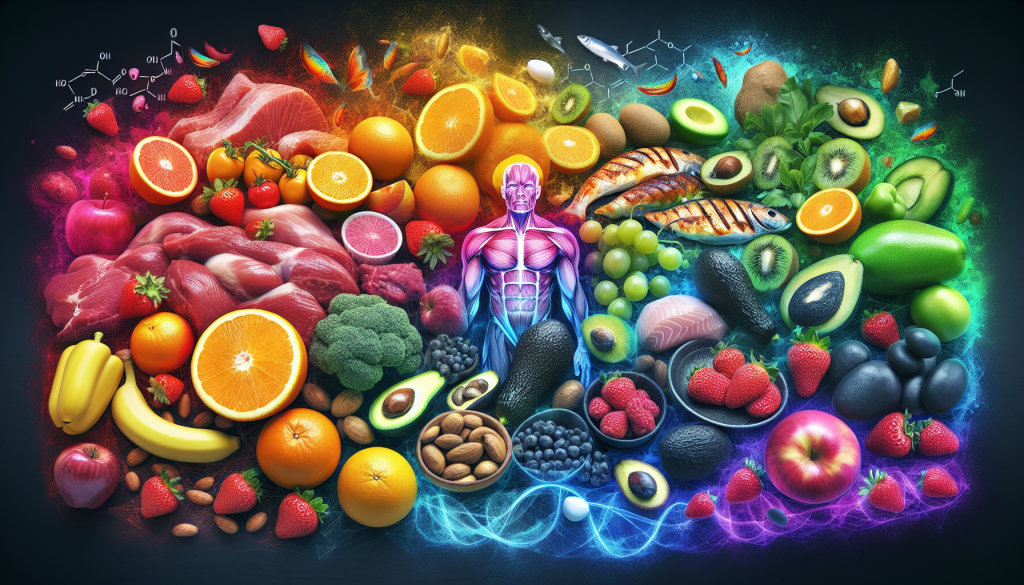Ad Blocker Detected
Our website is made possible by displaying online advertisements to our visitors. Please consider supporting us by disabling your ad blocker.
Did you know that certain foods can naturally boost your testosterone levels? Increasing your testosterone can have a variety of benefits, including increased energy, improved muscle growth, and enhanced libido. In this article, we will discuss the top 10 testosterone-boosting foods that you can easily incorporate into your diet. From oysters to spinach, these foods are not only delicious but can also help you optimize your hormone levels naturally. So, if you’re looking to boost your testosterone and enjoy all the advantages that come with it, keep reading to discover the best foods to include in your meals.

This image is property of images.unsplash.com.
Red Meat
Red meat, including beef, lamb, and pork, has long been associated with boosting testosterone levels. These meats are high in protein and saturated fats, which are both crucial for the production of testosterone. Protein provides the building blocks needed for testosterone synthesis, while saturated fats play a role in hormone production.
Beef, in particular, is rich in zinc, a mineral that is essential for the production of testosterone. Zinc helps in the formation of the hormone’s precursor molecules. Additionally, red meats are a great source of creatine, an organic compound that aids in muscle growth and strength. Incorporating red meat into your diet can provide the necessary nutrients for maintaining optimal testosterone levels.
Beef
Beef is a powerhouse when it comes to boosting testosterone. It is not only rich in protein but also packed with essential vitamins and minerals. As mentioned earlier, beef contains high levels of zinc, which is vital for testosterone production. It also contains vitamin D, which is known to have a positive correlation with testosterone levels.
Furthermore, beef is an excellent source of cholesterol, and contrary to popular belief, dietary cholesterol has little impact on blood cholesterol levels. However, cholesterol is a crucial precursor for testosterone synthesis. By including lean cuts of beef in your diet, you can help support healthy testosterone levels.
Lamb
Lamb is another red meat that can contribute to increasing testosterone levels. Like beef, lamb is an excellent source of protein and essential amino acids. It also contains high amounts of zinc, which as mentioned earlier, plays a crucial role in testosterone production.
Moreover, lamb is rich in iron, a mineral that is vital for overall health and well-being. Iron deficiency can lead to decreased testosterone levels and diminished energy levels. By incorporating lamb into your meals, you can enjoy its nutritional benefits and aid in optimizing testosterone production.
Pork
Pork, especially lean cuts like tenderloin, can also be beneficial for testosterone levels. Similar to beef and lamb, pork is a great source of protein and saturated fats, both of which are essential for testosterone synthesis. It also contains vitamins B6 and B12, which are known to be involved in hormone regulation.
Pork is also rich in selenium, a mineral that helps protect the body from oxidative stress and inflammation. This can be beneficial for hormone production and overall testosterone levels. When choosing pork, opt for lean cuts and try to minimize processed or cured variations to maximize its health benefits.
Shellfish
Shellfish are another group of foods known for their testosterone-boosting properties. Oysters, lobsters, and shrimp, in particular, are often hailed as natural aphrodisiacs and have been linked to increased testosterone production.
Oysters
Oysters have gained a reputation as a potent aphrodisiac due to their high zinc content. Zinc is a critical nutrient for testosterone production and helps promote healthy sperm production. Oysters also contain other essential minerals and vitamins, such as selenium and vitamin D, which further contribute to hormone regulation.
Moreover, oysters are rich in amino acids, omega-3 fatty acids, and antioxidants, all of which can support overall health and well-being. Including oysters in your diet, whether raw or cooked, can provide numerous nutritional benefits and potentially boost testosterone levels.
Lobsters
Lobsters are not only a delicious delicacy but also a great source of nutrients that can enhance testosterone production. Like oysters, lobsters are known for their high zinc content, making them a valuable addition to a testosterone-boosting diet. Zinc helps support the enzymatic reactions necessary for testosterone synthesis.
Lobsters are also rich in vitamins and minerals such as vitamin B12, copper, and selenium, which are all involved in hormone regulation. These nutrients contribute to overall health and can have a positive effect on testosterone levels. So, don’t hesitate to indulge in a lobster dish every now and then to reap the potential benefits.
Shrimp
Shrimp is a versatile shellfish that can provide several nutritional advantages, including supporting healthy testosterone levels. Similar to oysters and lobsters, shrimp contains significant amounts of zinc, which aids in testosterone production. Zinc helps stimulate the production of hormones essential for sperm production and overall reproductive health.
Additionally, shrimp is low in calories and fat, making it a healthy protein source. It also contains omega-3 fatty acids, which promote heart health and can indirectly support testosterone levels. Including shrimp in your meals can contribute to a well-rounded diet and potentially offer testosterone-boosting effects.

This image is property of images.unsplash.com.
Eggs
Eggs are a nutrient-packed food that can help increase testosterone levels. Whether consuming whole eggs or just the yolks, eggs offer various essential nutrients that support hormone production.
Whole Eggs
Whole eggs are an excellent source of complete protein, which contains all the essential amino acids needed for testosterone synthesis. Protein is crucial for muscle growth and repair, and an adequate intake can support healthy testosterone levels. Furthermore, whole eggs are rich in cholesterol, a building block for testosterone production.
Eggs are also a natural source of vitamin D, which has a positive correlation with testosterone levels. Vitamin D deficiencies have been associated with low testosterone levels, so ensuring sufficient intake of this vitamin is essential. By enjoying whole eggs as part of your diet, you can provide your body with the necessary nutrients for optimal testosterone production.
Egg Yolks
While the entire egg can contribute to testosterone production, the yolk, in particular, contains several key nutrients. Yolks are rich in cholesterol, which plays a vital role in hormone synthesis. Cholesterol is the precursor for testosterone production, and including egg yolks in your diet can help ensure adequate levels for hormone synthesis.
Additionally, egg yolks contain vitamins and minerals, such as vitamins B6 and D, which are involved in hormone regulation. These nutrients contribute to overall health and can positively impact testosterone levels. So, don’t shy away from adding egg yolks to your meals for a potential testosterone boost.
Bananas
Bananas are not only a delicious and convenient snack but also a fruit that offers testosterone-boosting benefits. They are rich in natural sugars, vitamins, and minerals that support hormone production.
Bananas are an excellent source of the mineral potassium, which is essential for testosterone synthesis. Potassium helps in the conversion of androstenedione, a hormone precursor, into testosterone. By consuming bananas, you can provide your body with the necessary potassium to support testosterone production.
Furthermore, bananas contain vitamin B6, which has been linked to improved testosterone levels. This vitamin plays a role in the regulation of steroid hormones and can help maintain optimal testosterone levels. So, next time you need a quick and nutritious snack, reach for a banana to potentially support your testosterone levels.

This image is property of images.unsplash.com.
Fortified Plant Milks
Fortified plant milks, such as soy milk and almond milk, offer a dairy-free alternative that can potentially boost testosterone levels. These plant-based milks are often fortified with nutrients, including vitamins and minerals that support hormone production.
Soy Milk
Soy milk is a popular plant-based milk made from soybeans. It is rich in phytoestrogens, which are plant compounds that resemble estrogen. While estrogen is typically associated with female hormones, studies suggest that phytoestrogens may have a positive impact on testosterone levels in men.
Soy milk is also high in protein and contains essential amino acids necessary for testosterone synthesis. Additionally, it is often fortified with vitamins and minerals such as calcium, vitamin D, and vitamin B12, which contribute to overall hormone regulation. Including soy milk as part of a balanced diet can provide the nutrients needed for optimal testosterone production.
Almond Milk
Almond milk is another popular plant-based milk that can support testosterone levels. Like soy milk, almond milk is often fortified with essential nutrients such as vitamin D and calcium. Vitamin D is crucial for testosterone production, and calcium is involved in hormone regulation.
Almond milk is also a good source of healthy fats, which are necessary for hormone production. These healthy fats, along with the presence of vitamin E in almond milk, can promote overall reproductive health and potentially impact testosterone levels positively. Whether used in beverages or added to recipes, almond milk can be a nutritious addition to support testosterone synthesis.
Ginger
Ginger is a spice often used in culinary dishes and traditional medicine, and it also offers potential testosterone-boosting benefits. Studies suggest that ginger may enhance testosterone production and improve reproductive health.
Ginger contains gingerol, a bioactive compound that has been found to increase testosterone levels in animal studies. While further research is needed to fully understand the effects in humans, adding ginger to your meals or enjoying it as a tea can provide potential benefits.
Moreover, ginger has antioxidant and anti-inflammatory properties, which can support overall health. By including this flavorful spice in your diet, you can potentially promote testosterone synthesis and enjoy its other health benefits.

Pomegranates
Pomegranates are a delicious and vibrant fruit that can contribute to increasing testosterone levels. They are rich in antioxidants, vitamins, and minerals that can support hormonal health.
Pomegranates contain high levels of dietary nitrate, a compound that has been shown to increase testosterone levels. Nitric oxide, derived from dietary nitrates, plays a role in vasodilation and blood flow, which are crucial for hormone production.
Furthermore, pomegranates are rich in antioxidants, which help protect the body from oxidative stress and inflammation. These benefits can indirectly contribute to optimal testosterone levels. So, indulge in pomegranate juice or enjoy the arils as a snack to potentially support healthy testosterone production.
Garlic
Garlic is a popular ingredient in many culinary dishes, but it also offers potential benefits for testosterone levels. Garlic contains allicin, a compound known for its various health-promoting properties.
Allicin has been found to stimulate testosterone production in animal studies. While further research is needed to confirm the effects in humans, incorporating garlic into your diet can potentially support hormone regulation.
Garlic also boasts antioxidant and immune-boosting properties, which contribute to overall health and well-being. Whether used in savory dishes or enjoyed raw, garlic can provide potential testosterone-boosting benefits along with its delicious flavor.
Tuna
Tuna is a fatty fish that can offer several advantages when it comes to testosterone levels. It is packed with protein and loaded with essential nutrients that support hormone production.
Tuna is a great source of vitamin D, which is known to have a positive correlation with testosterone levels. It is also rich in omega-3 fatty acids, which have been linked to increased testosterone production.
Furthermore, tuna contains selenium, a mineral that supports antioxidant function and overall hormone health. By including tuna in your diet, whether grilled, canned, or sashimi, you can enjoy its nutritional benefits and potentially support testosterone synthesis.
Can Eating Nuts Help Boost Testosterone Levels?
Eating nuts can play a role in boosting testosterone with nuts as they are high in nutrients like magnesium and zinc, which are essential for testosterone production. Additionally, nuts are a great source of healthy fats, which can also support hormone balance and overall health.
Cruciferous Vegetables
Cruciferous vegetables, including broccoli, cabbage, and cauliflower, are not only nutritious but also offer potential testosterone-boosting benefits. These vegetables contain various compounds that can help balance hormone levels.
Broccoli
Broccoli is a versatile vegetable that is rich in nutrients and beneficial for overall health. It contains a compound called indole-3-carbinol (I3C), which has been found to help balance hormone levels, specifically in relation to estrogen.
By promoting a healthy estrogen balance, I3C indirectly supports testosterone production. This compound helps prevent the conversion of testosterone into estrogen, helping to maintain optimal hormone levels.
Broccoli is also high in fiber, vitamins, and minerals, which contribute to overall health and well-being. Including broccoli in your meals can provide numerous nutritional benefits, including potential support for testosterone levels.
Cabbage
Cabbage is another cruciferous vegetable that can contribute to optimizing testosterone levels. It contains sulfur compounds that aid in hormone regulation and support a healthy estrogen balance.
Sulfur compounds found in cabbage help promote the breakdown of estrogen, reducing its potential negative impact on testosterone levels. By including cabbage in your diet, whether in salads, soups, or stir-fries, you can enjoy its nutritional benefits and potentially support healthy hormone production.
Cauliflower
Cauliflower, similar to broccoli and cabbage, is a cruciferous vegetable that can help balance hormone levels. It contains compounds like I3C and sulforaphane, which have been found to support hormone regulation.
These compounds work by assisting in the breakdown of estrogen and maintaining a healthy estrogen balance. By incorporating cauliflower into your meals, whether roasted, mashed, or used as a rice substitute, you can potentially support testosterone production and benefit from its nutritional properties.
In conclusion, incorporating certain foods into your diet can potentially help boost testosterone levels. Red meats like beef, lamb, and pork, along with shellfish such as oysters, lobsters, and shrimp, are rich in protein, saturated fats, and key nutrients like zinc that support testosterone synthesis. Eggs, particularly the yolks, are another excellent source of essential nutrients like vitamins B6 and D, as well as cholesterol, necessary for hormone production. Bananas, fortified plant milks like soy milk and almond milk, and spices like ginger and garlic offer additional options for testosterone-boosting foods. Pomegranates, tuna, and cruciferous vegetables such as broccoli, cabbage, and cauliflower also provide potential benefits for hormone regulation. By incorporating these foods into a balanced diet, you can potentially support healthy testosterone levels and overall well-being.



